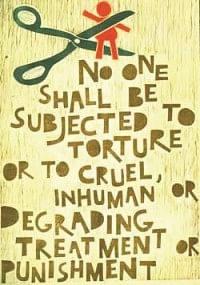Law event
UN urges better protection for women in fight against torture
 Despite a strong international legal framework outlawing torture, much more needs to be done to end this scourge, United Nations human rights officials have stressed, adding that special attention be given to ensuring better protection for women.
Despite a strong international legal framework outlawing torture, much more needs to be done to end this scourge, United Nations human rights officials have stressed, adding that special attention be given to ensuring better protection for women.
The Universal Declaration of Human Rights, which is celebrating its 60th anniversary this year, provided for the first international prohibition of torture, and successive human rights treaties have built on this provision.
However, six decades later, greater efforts are needed to prevent torture, punish the perpetrators and ensure adequate assistance for the victims, six UN entities that deal with the issue stressed in a statement marking the International Day in Support of Victims of Torture, observed annually on 26 June.
They noted that women fall victim to torture in different ways, as highlighted by Secretary-General Ban Ki-moon's global campaign to end violence against women, launched in February of this year.
"Certain forms of gender-specific violence perpetrated by State actors, as well as by private individuals or organisations, clearly amount to torture, and it is now recognised that gender-specific violence falls within the definition of torture in the Convention against Torture," they stated.
They called for strengthening the global campaign to end violence against women, by ensuring a broader scope of prevention, protection, justice and reparation for victims, including access to international assistance, than currently exists.
In addition, they appealed for increased contributions to the UN Voluntary Fund for Victims of Torture which distributes funds to non-governmental organizations (NGOs) and treatment centres to assist those subjected to this horrific practice and their families so that more torture victims can receive the help they need.
"We call on all States, in particular those which have been found to be responsible for widespread or systematic practices of torture, to contribute to the Voluntary Fund as part of a universal commitment for the rehabilitation of torture victims," they stated.
The signatories of the statement are UN High Commissioner for Human Rights Louise Arbour; the UN Committee against Torture; the Subcommittee on Prevention of Torture; the Special Rapporteur on torture and other cruel, inhuman or degrading treatment or punishment; the Special Rapporteur on violence against women, its cause and consequences; and the Board of Trustees of the UN Voluntary Fund for Victims of Torture.
UNAMA has been working closely with the Afghanistan Independent Human Rights Commission to enhance the protection of civilians, advance the rights of women and girls, improve access to justice, help safeguard freedom of expression, and support implementation of the transitional justice agenda.
Source: UN News Service.
Withdraw reservation regarding compensation of torture victims
“No one shall be subjected to torture or to inhuman or degrading treatment or punishment.”
Odhikar, on June 26, 2008, organized an event on the occasion of International Day in Support of Victims of Torture, at the Dhaka Press Club. Torture is one of the most profound human rights abuses, taking a terrible toll on millions of individuals and their families. The speakers of the roundtable included A B M Musa, Khushi Kabir, Ataus Samad, Professor Mizanur Rahman, and Professor Anwarul Hassan.
Farhad Mazhar, Adviser, Odhikar, informed that Bangladesh acceeded the Convention Against Torture (CAT) in 1998. However the Optional Protocol to the Convention against Torture and other Cruel, Inhuman or Degrading Treatment or Punishment (OPCAT) had not been adopted. Upon accession these laws become a part of the domestic law and are directly applicable in the courts.
Article 14, of the Convention against Torture states, “Each State Party shall ensure in its legal system that the victim of an act of torture obtains redress and has an enforceable right to fair and adequate compensation including the means for as full rehabilitation as possible. In the event of the death of the victim as a result of an act of torture, his dependents shall be entitled to compensation...”
However this Article has been reserved by Bangladesh Government which actually frustrated the very spirit of the CAT.
Worldwide a lot of debate on the issue of torture is taking place. The debate is on whether protection of national security precedes over the violation of human rights of citizens. Definitions are better defined. There is now profound knowledge of torture methods, the effects of torture, and how to diagnose and rehabilitate torture victims.
Odhikar has reported 29 case studies and circulated to persons concerned about human rights situation in Bangladesh. At the roundtable Odhikar brought out three victims of torture by law enforcing agencies and each of them shared their experiences and sufferings with all those present at the roundtable. Blows to the soles of the feet, suffocation in water, burns, electric shocks, sleep deprivation, torturers to break down an individual's personality are commonly used shaking and beating. As terrible as the physical wounds are, the psychological and emotional scars are usually the most devastating and the most difficult to repair. Many torture survivors suffer recurring nightmares and flashbacks. They withdraw from family, school and work and feel a loss of trust.
At the roundtable the speakers urged that infliction of torture unacceptable in any form of government or at any time. They also urged to withdraw the reservation over Article 14 and adopt the OPCAT. Torture is not just a matter of debate; it's a matter of feeling the pain, the trauma, which one suffers. It's intolerable.
-Law Desk.